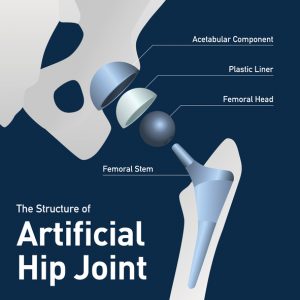Hip replacement
Any place in the body where two or more bones meet is called a joint. The hip is one of the largest weight-bearing joints in your body and can be thought of as a ball and socket. Constant wear and tear on the protective covering called cartilage – used to keep the joint moving smoothly – can instead leave the joint stiff and painful.
Several conditions can lead to hip pain, including osteoarthritis, rheumatoid arthritis, post-traumatic arthritis, avascular necrosis, and childhood hip disease.
What is hip replacement?
Welia Health’s orthopedic specialists are experienced in performing joint replacements, most commonly, replacements of the hip, knee and shoulder. During a total hip replacement, the damaged cartilage and bone will be removed, and the new metal, plastic, or ceramic implants will be positioned to restore the alignment and function of the hip.
What symptoms are common?
Symptoms may come on gradually and may come and go. They may occur after walking, bending or climbing stairs. Pain may begin to appear while sitting, laying down or sleeping and may last for longer periods of time. Most patients first feel pain in the groin or on the side of the back of the hip. Pain may also extend down the thigh to the knee. Hips may also feel stiff or tight.
When is surgery recommended?

In order to determine the cause and severity of the hip condition, our orthopedic specialists conduct a series of diagnostic tests, which may include simple x-rays to more sophisticated MRI imaging, comprehensive physical examination and a thorough medical history review.
The American Academy of Orthopaedic Surgeons suggests several reasons why hip replacement surgery may be recommended:
- Hip pain that limits everyday activities, such as walking or bending
- Hip pain that continues while resting, either day or night
- Stiffness in a hip that limits the ability to move or lift the leg
- Inadequate pain relief from anti-inflammatory drugs, physical therapy, or walking supports
In most cases, patients will follow a more conservative treatment plan to control symptoms without surgery. This may include an exercise and/or weight loss program, a walking aid such as a cane, or medical therapy. If these nonsurgical treatments do not provide relief, hip replacement may be recommended. In these cases, the Welia Health team spends ample time with each surgical patient to review potential risks and complications, including those related to the surgery and others that can occur over time following surgery
What can I expect from surgery?
If both the Welia orthopedic specialist and patient determine that surgical treatment is the best approach, the orthopedic specialist guides each patient through the entire process to prepare them for what to expect before, during and following the procedure, including the first steps following surgery and the full recovery process.
You will most likely stay in the hospital for a few days. To protect your hip during early recovery, a positioning splint, such as a foam pillow placed between your legs, may be used. Because some pain is normal during recovery, medications are often used on a short-term basis to aid recovery. Walking is important after surgery and will likely begin the day after surgery. Physical therapy, which will start the day following surgery, strengthens the muscles around the hip and helps to restore movement.
A patient’s active engagement in their recovery process is critical to long-term success. The importance of following recommendations on nutrition, exercise and medications cannot be overstated.
The majority of patients are able to perform daily activities more easily after hip replacement surgery. Most people can expect their hip replacement to last for many years, giving them an improved quality of life with less pain, along with improved motion and strength.
Orthopedic services are available in Mora, Hinckley and Pine City. Call Welia Health at 320.679.1313 or schedule an appointment using MyChart.
A referral may be required from your primary care provider, please check with your insurance carrier.

